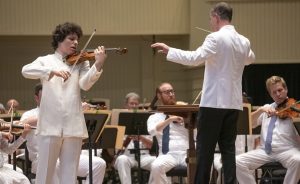
Review by Zachary Lewis:
Someone at the Chautauqua Symphony Orchestra clearly knows what he’s doing.
Case in point: the group’s concert Thursday night in the Amphitheater, the third in the orchestra’s season-long Russian Festival with Music Director Rossen Milanov.
In both program and performance, not a thing was flawed. Every element was in its place. Indeed, it was as if the music and the performers were meant for each other, a case of artistic planning at its finest.
Whoever first invited violinist Augustin Hadelich to Chautauqua, and succeeds in bringing him back, is certainly a genius. A longtime and frequent guest whose bright star only continues to rise, Hadelich has been, and was again Thursday, an enormous addition to the musical life of this place.
It’s not every violinist who can do what Hadelich did Thursday: lead an audience straight through the daunting twists and turns of Prokofiev’s Violin Concerto No. 2, without a single detour or moment’s wandering.
Where lesser violinists string together episodes to make some kind of whole, Hadelich wove three thoroughly cogent, seamless arguments, each more articulate and compelling than the last. The result was a reading that exposed both how deeply Prokofiev sits in Hadelich’s wheelhouse and how special his relationship is with the CSO.
Struggle had no place in Hadelich’s performance. Every technical tool was there, at the ready, in a performance as collected and suave as possible. What’s more, that technique served the music. In the finale, especially, the violinist’s sense of freedom was both palpable and infectious. As he romped and frolicked with abandon, listeners did so, too, right along with him.
But the highlight of the performance was surely the Andante. Out of that haunting music, Hadelich crafted something truly memorable, a musical time-out that managed both to enchant and engage. That movement alone warranted an encore, and the concerto as a whole warranted an open invitation for Hadelich to return at will.
Another instance of programming brilliance? The second work on the program, Rachmaninoff’s Symphony No. 2. If ever a conductor were suited to negotiate this nearly hour-long creation by the last great bastion of Russian Romanticism, it was Milanov.
Never has an hour in concert passed so quickly. By keeping his sights trained on melody and motive, Milanov virtually sidestepped time altogether, grabbing and holding the attention of his listeners through each of the work’s four segments.
Lustrous string tone and continual upwellings of momentum made short, absorbing work of the opening movement, and the fourth under Milanov was no mad dash, but rather an irresistible recap, a propulsive survey before a dazzling finish.
The second movement, too, was a thriller. The CSO all but devoured its first half, tearing into the music with ferocious zeal, and the second half saw an orchestra at the height of lyrical perfection.
But again, it was the slow movement, the Adagio, that stole the show. Aided by a golden clarinet, Milanov conducted this most famous of melodies the way Rachmaninoff himself might have played it on the piano, with shape and nuance and wave upon wave of emotion.
Many listeners Thursday left at intermission, daunted by the prospect of a 60-minute symphony. Boy did they miss out. Chalk it up to a lack of understanding. Unlike the CSO’s artistic planners, they must not realize what this group is capable of.
Zachary Lewis is the classical music and dance critic of The Plain Dealer in Cleveland.




